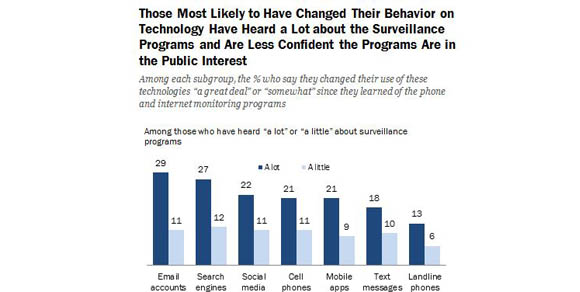
In December, we posted about a Pew Research Center study that found that the more Americans know about government surveillance programs, the more they are concerned about their own data security. In a follow-up report, Pew asked the 475 adults (87%) who had heard at least a little about the programs how this knowledge has changed their technology behaviors.
They found that at least some, but not an overwhelming amount, are altering their strategies when it comes to information and communication technologies. Almost one-fifth (18%) changed how they use their email accounts, which was the most common behavioral modification asked about. Other common ways of responding to insecurities about data included changing how they use search engines, social media, cell phones, and mobile apps.
Overall, close to a quarter (22%) of those surveyed has changed their technology behaviors at least somewhat. Most changes were relatively simple, such as creating a more complex password and reworking privacy settings. But Pew’s findings indicate that not all of those aware of surveillance programs actually know how to protect their own information, since over half (54%) think it would be at least “somewhat difficult” to utilize tools and strategies for data security.
The survey also reveals that American adults are worried not only about government surveillance but also about criminals and systematic hacking threats. In our information driven culture, knowledge about how to properly protect our personal data becomes more important every day.
Find out more about this report and others in the series here.
Note: This post is part of our series, “The Weekly Number.” In this series, we highlight statistics that help tell the story of the 21st-century library.